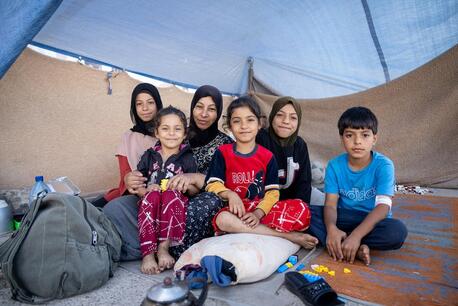
Leveling the Playing Field
Education can be a critical tool for addressing poverty and protecting children from forced labor, child marriage and trafficking.
Sexual exploitation, forced labor, trafficking and child marriage have many root causes, including gender inequality and instability due to crises. Poverty, however, is one of the most prominent vulnerabilities that can be exploited, regardless of what form the exploitation takes. For example, more than 50 percent of girls from the poorest families in the developing world are married before age 18. Girls in child marriages are also more likely to remain poor than their unmarried counterparts.
Child marriage perpetuates a cycle of poverty

Girls Not Brides is a global partnership of more than 1,000 civil society organizations committed to ending child marriage and enabling girls to fulfill their potential. (Graphic from Girls Not Brides)
Children born into poor families are also more likely to be engaged in child labor. In fact, approximately one in four of the world's poorest children are estimated to be engaged in labor practices that are potentially harmful to the child's health and development, perpetuating cyclical poverty. Exposure to violence, including as a result of trafficking and forced labor, can further hinder a child's ability to reach their full potential.
A good education can protect children from child labor, child marriage and trafficking
While exploitation may disproportionately impact the most economically disadvantaged, education can be a critical tool for addressing poverty and reducing vulnerability to child labor, child marriage and trafficking.
Access to education is a critical right enshrined in Article 28 of the Convention on the Rights of the Child. Education is crucial because it gives the next generation the tools to fight poverty and prevent disease. It can help break cycles of poverty and provide the future generation with more options to reach their full potential. UNICEF's report, Harrowing Journeys, suggests that access to education can reduce a child's likelihood of experiencing exploitation while on the move.
Educated girls are more likely to have healthier, better educated children
These positive outcomes are especially true when it comes to educating girls, which has been shown to have a "multiplier effect" — meaning that educated girls are more likely to receive better wages, give birth to fewer and healthier children, and have more opportunities to participate in leadership and decision-making. Girls' education may also save the world between $15 trillion and $30 trillion in lost lifetime productivity and earnings.
While children are more likely to bear the burden of poverty, access to education presents an opportunity to combat exploitation before it arises. Learn more about how UNICEF is working to ensure that every child has access to education and empowering young people through Generation Unlimited.
How can I get involved?
- Join UNICEF UNITE
- Become a monthly donor
- Spread the word by sharing this article or posting on your own social media accounts using the UNICEF USA Social Press Kit and the hashtag #EndTrafficking
Hanna Cody is a former global citizenship fellow with UNICEF USA's End Trafficking Project.
Photo at top: Girls raise their fists in solidarity at the Ashram boarding school in Thutibar in India's Rayagada district. India has the highest number of child brides in the world. An estimated 27 percent of girls in India are married before their 18th birthday. © UNICEF/UN0267945/Akhbar Latif
HOW TO HELP
There are many ways to make a difference
War, famine, poverty, natural disasters — threats to the world's children keep coming. But UNICEF won't stop working to keep children healthy and safe.
UNICEF works in over 190 countries and territories — more places than any other children's organization. UNICEF has the world's largest humanitarian warehouse and, when disaster strikes, can get supplies almost anywhere within 72 hours. Constantly innovating, always advocating for a better world for children, UNICEF works to ensure that every child can grow up healthy, educated, protected and respected.
Would you like to help give all children the opportunity to reach their full potential? There are many ways to get involved.




